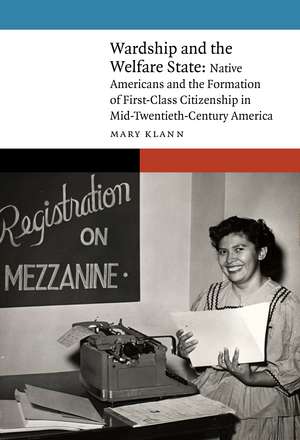Wardship and the Welfare State: Native Americans and the Formation of First-Class Citizenship in Mid-Twentieth-Century America: New Visions in Native American and Indigenous Studies
Autor Mary Klannen Limba Engleză Hardback – iun 2024
Wardship and the Welfare State explores how policymakers and legislators have defined first-class citizenship against its apparent opposite, the much older and fraught idea of Indian wardship. Wards were considered dependent, while first-class citizens were considered independent. Wards were thought to receive gratuitous aid from the government, while first-class citizens were considered responsible. Critics of the federal welfare state’s expansion in the 1930s through 1960s feared that as more Americans received government aid, they too could become dependent wards, victims of the poverty they saw on reservations. Because critics believed wardship prevented Native men and women from fulfilling expectations of work, family, and political membership, they advocated terminating Natives’ trust relationships with the federal government. As these critics mistakenly equated wardship with welfare, state officials also prevented Native people from accessing needed welfare benefits.
But to Native peoples wardship was not welfare and welfare was not wardship. Native nations and pan-Native organizations insisted on Natives’ government-to-government relationships with the United States and maintained their rights to welfare benefits. In so doing, they rejected stereotyped portrayals of Natives’ perpetual poverty and dependency and asserted and defined tribal sovereignty. By illuminating how assumptions about “gratuitous” government benefits limit citizenship, Wardship and the Welfare State connects Native people to larger histories of race, inequality, gender, and welfare in the twentieth-century United States.
Preț: 512.40 lei
Nou
Puncte Express: 769
Preț estimativ în valută:
98.07€ • 101.07$ • 82.80£
98.07€ • 101.07$ • 82.80£
Carte tipărită la comandă
Livrare economică 03-17 martie
Preluare comenzi: 021 569.72.76
Specificații
ISBN-13: 9781496218179
ISBN-10: 1496218175
Pagini: 326
Ilustrații: Index
Dimensiuni: 152 x 229 x 15 mm
Greutate: 0.65 kg
Editura: Nebraska
Colecția University of Nebraska Press
Seria New Visions in Native American and Indigenous Studies
Locul publicării:United States
ISBN-10: 1496218175
Pagini: 326
Ilustrații: Index
Dimensiuni: 152 x 229 x 15 mm
Greutate: 0.65 kg
Editura: Nebraska
Colecția University of Nebraska Press
Seria New Visions in Native American and Indigenous Studies
Locul publicării:United States
Notă biografică
Mary Klann is a lecturer in U.S. history and Native American history at the University of California–San Diego.
Cuprins
Acknowledgments
Note on Terminology, Usage, and Poetry
List of Abbreviations
Introduction
1. Red Tape: An Introduction to Native Dual Citizenship in the Mid-Twentieth Century
2. Indian Poverty Knowledge: Defining First-Class Citizenship through Competency Legislation
3. Every Day with the BIA: Welfare Applications and Wardship’s Definitions
4. Gender and Wardship: Surveillance, Dependency, and Welfare’s Limitations
5. Improving Farms and Homes: Assimilation and the GI Bill’s Educational Provisions
6. Nebulous Shame, Innocent Taxpayers, and the Native Plight: Native Land and the Welfare State
7. Care Taken to Inform: Relational Wardship, Welfare, and Sovereignty
Conclusion
Epilogue
Notes
Bibliography
Index
Note on Terminology, Usage, and Poetry
List of Abbreviations
Introduction
1. Red Tape: An Introduction to Native Dual Citizenship in the Mid-Twentieth Century
2. Indian Poverty Knowledge: Defining First-Class Citizenship through Competency Legislation
3. Every Day with the BIA: Welfare Applications and Wardship’s Definitions
4. Gender and Wardship: Surveillance, Dependency, and Welfare’s Limitations
5. Improving Farms and Homes: Assimilation and the GI Bill’s Educational Provisions
6. Nebulous Shame, Innocent Taxpayers, and the Native Plight: Native Land and the Welfare State
7. Care Taken to Inform: Relational Wardship, Welfare, and Sovereignty
Conclusion
Epilogue
Notes
Bibliography
Index
Recenzii
“This research is timely and significant not only for scholarship on Indigenous peoples and the state but also for contemporary political battles over Indigenous sovereignty. Wardship and the Welfare State addresses matters of critical importance to our current political discourse on poverty, the state, and citizenship broadly, and it makes a substantial contribution to two historiographies: Indigenous and policy studies. This book is also imminently readable.”—Katherine M. B. Osburn, author of Choctaw Resurgence in Mississippi: Race, Class, and Nation Building in the Jim Crow South, 1830–1977
“Mary Klann impressively covers a range of policy and legal decisions across the United States, furthering our understanding of how settler-colonial ideologies defined political and legal decisions in the mid- to late twentieth century. Wardship and the Welfare State is a unique contribution to the historiography of Native American policy and a fabulous piece of scholarship.”—Kyle E. Ciani, author of Choosing to Care: A Century of Childcare and Social Reform in San Diego, 1850–1950
“In clear and vivid prose, Wardship and the Welfare State shows how Native people navigated complex legal and bureaucratic systems that governed access to resources in the twentieth-century United States. . . . Anchored in stories of Native peoples’ understandings of wardship and welfare, Mary Klann expands our understanding of care—who has access to it, who deserves it, how people fight for it, and how it is always politically charged.”—Jessica Wilkerson, author of To Live Here, You Have to Fight: How Women Led Appalachian Movements for Social Justice
Descriere
Wardship and the Welfare State examines the ideological dimensions and practical intersections of public policy and Native American citizenship, Indian wardship, and social welfare rights after World War II.















